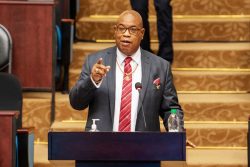Three weeks after the fire at the Mahdia Secondary School dormitory that claimed the lives of 20 children and left many others injured and traumatised the government is still to announce the anticipated inquiry into the tragedy.
There have been many distractions in recent days but the government and President Ali must have their priorities in the right order. The gravity of this disaster is an indictment on all concerned and raises searing questions about the manner in which those in authority have cared for children from indigenous villages in the dorms.
It is vital that a rigorous examination be undertaken of the circumstances and perhaps there is still time to ensure that the terms of reference of the inquiry and the inquirers will be fit for purpose.
Two damning facts have been unearthed by this newspaper. The first is that the Mahdia fire service had advised in November last year and February this year that the grilled windows on the dorm were a fire hazard. Those grilled windows prevented the escape of the children on the fateful night. As is often the case in tragedies of this type, no one has owned up to responsibility for not taking action following the reports from the Mahdia fire service. The Region Eight Council and the Ministry of Local Government and Regional Development have to be accountable in this respect.
The second incriminating fact is the report commissioned by the Minister of Education, Priya Manickchand on the state of the dorms across the country with the assistance of UNICEF and the Canadian High Commission. This report tendered in May 2022 highlighted the absence of fire safety measures, unsatisfactory conditions and the dire need for counselling for those who were living in the dorms. This report is now more than a year old and had there been urgency in implementing the recommendations, as there should have been, the disaster of May 21st might have been obviated. The minister’s initial silence on this report in the wake of the fire was a material and significant omission on her part. The June 9th editorial in this newspaper has chronicled Minister Manickchand’s long association with dormitory matters – going all the way back to at least 2012 – and she and her ministry now have to defend why they were so unable to materially change the conditions in the dorms. Importantly Ms Manickchand has to avail to the public a detailed account of what she and her ministry did with the report on its receipt. And no, this doesn’t have to await the convening of the Commission of Inquiry.
It is quite possible that any Commission of Inquiry that might be appointed by President Ali under the Commissions of Inquiry Act might have to interrogate not only what Minister Manickchand did or did not do but also the part played by Cabinet and the President himself. It is at points like this that the sense of having a ceremonial Head of State in the Westminster system shows its value. A ceremonial President in these circumstances would have been entrusted with commissioning an inquiry that would possibly also have to examine the role of the head of the government in a tragedy of this magnitude.
Convening an inquiry lies with the President and flawed outcomes are a distinct possibility. Despite terms of reference that were quite clear, the Commission of Inquiry appointed by President Ali to inquire into the events of the March 2nd 2020 general elections shockingly omitted to address the dereliction of duty by the GECOM chair. How was that possible given the terms of reference accorded to the inquiry? That has never been explained and Justice of Appeal (retired) Singh is continuing to preside over elections as if nothing happened despite the incredulity that she inspired among the commissioners when she testified before the inquiry.
That failing must not be allowed in this Commission of Inquiry. It would be entirely appropriate for the President to invite the Leader of the House for Government Business to engage with the Leader of the Opposition on the questions of the terms of reference for the inquiry and who should sit on it. This should be a bipartisan effort and not one dictated by President Ali. It would also be advisable to mobilise experts in education and residential living rather than a judicial-type inquiry.
The deaths of these 20 children, the agony of the loss to their families and the trauma wrought on so many others demand an inquiry that will settle the question of accountability and transform these dorms into safe spaces.






